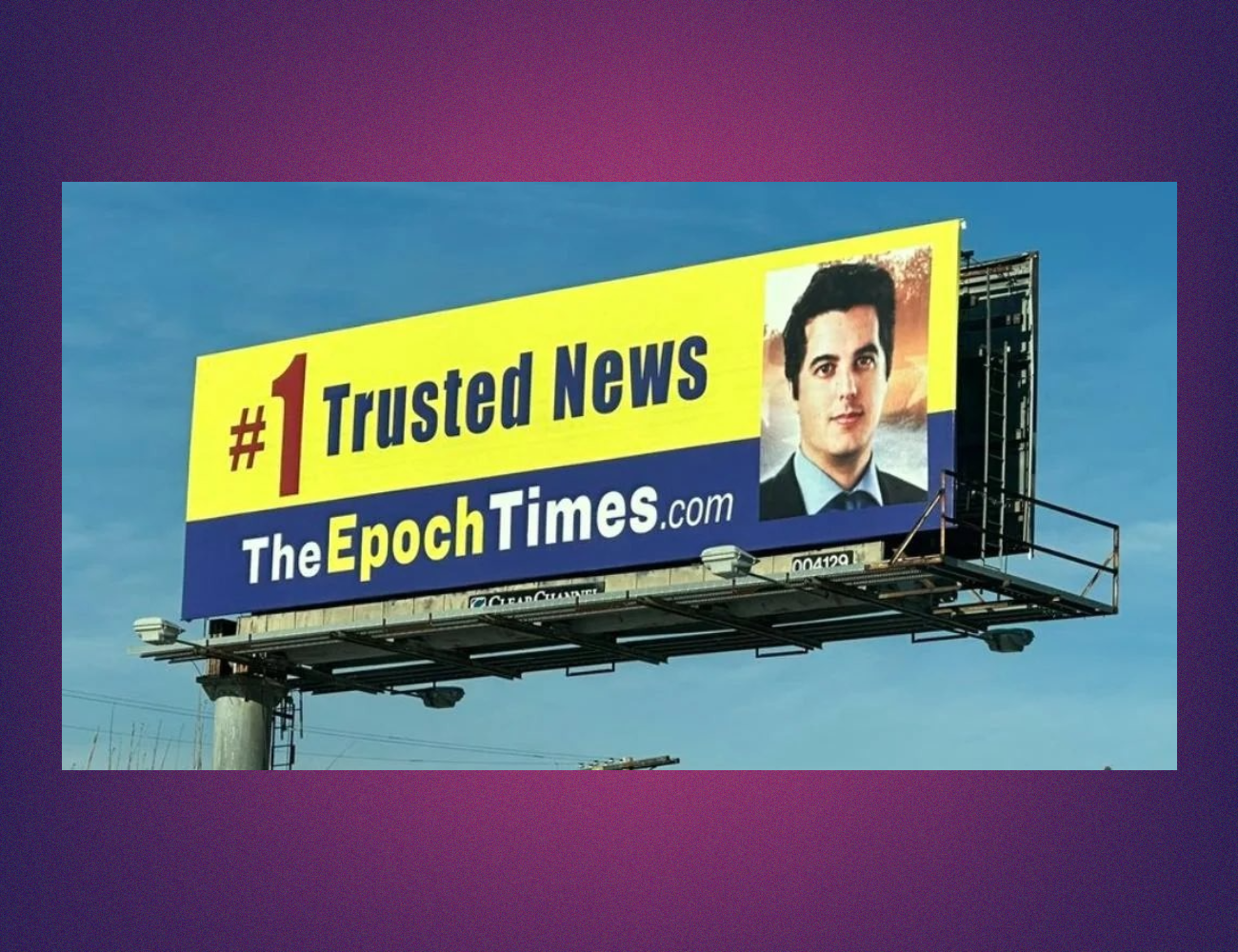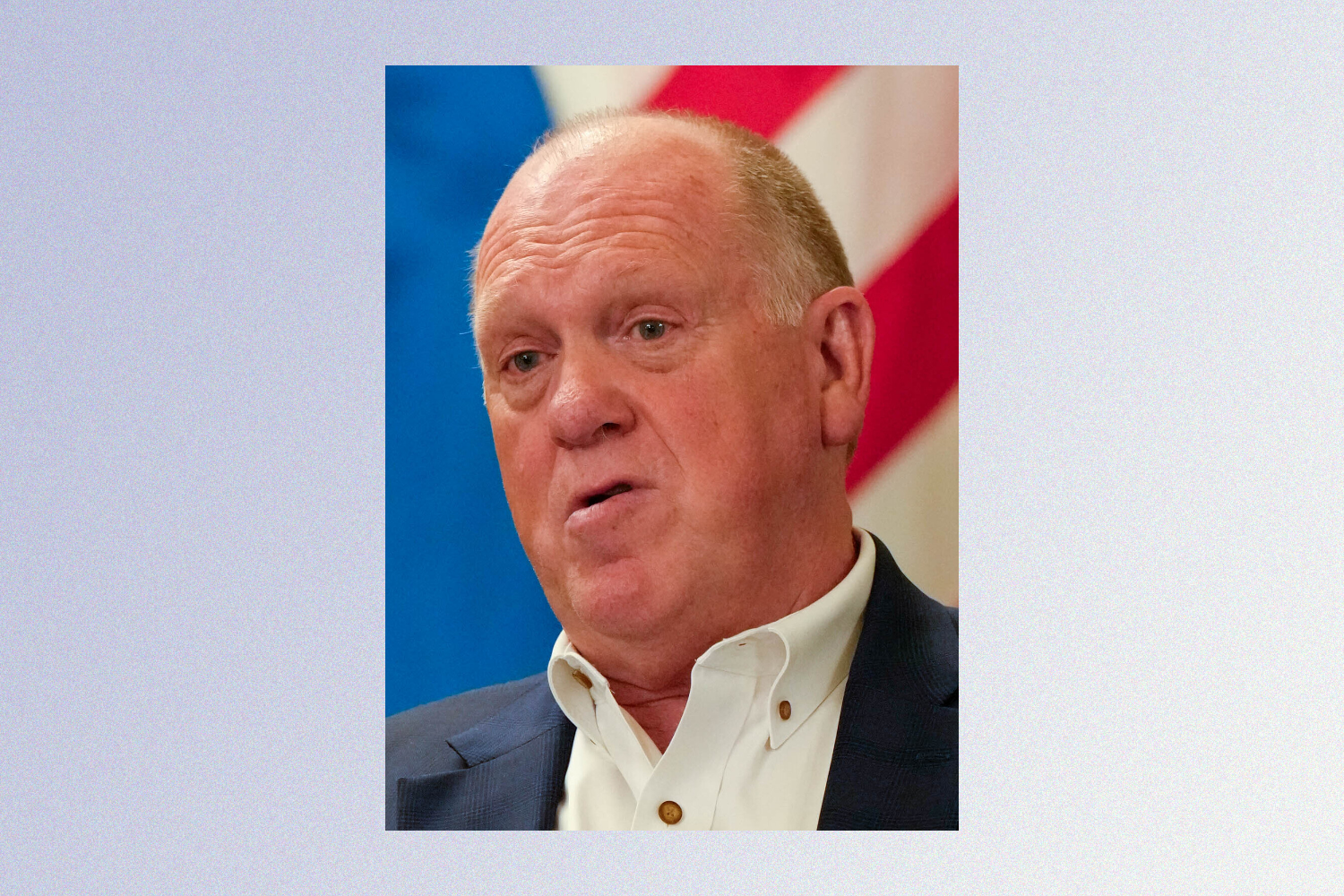We’ve all seen it. A simple yellow and blue background. An unidentified man, staring blankly in his suit. The words “#1 Trusted News” and “TheEpochTimes.com.” This odd billboard has sprouted up all over the Twin Cities in the past year or so, and similar billboards have appeared in Michigan, Colorado, Oregon, Tennessee, Ohio, and Wisconsin.
And if you aren’t among the 6.2 million people following its Facebook page, you may be wondering: What the hell is The Epoch Times?
This past January, it was reportedly the second-most visited right-wing news website, although it only attracted a fraction of Fox News’s website traffic. Alongside vanilla wire stories from the Associated Press, visitors to The Epoch Times might encounter headlines like “EXCLUSIVE: CDC Found Evidence COVID-19 Vaccines Caused Deaths” and “Facebook Moms Alarmed at ‘Dark’ Lyrics in Taylor Swift’s Latest Album.”
The outlet has grown into a “giant influence machine,” the New York Times reports, one that has “falsely [claimed] that Bill Gates and other elites are ‘directing’ the COVID-19 pandemic and allegations about a ‘Jewish mob’ that controls the world.” The man depicted on the billboards appears to be Joshua Philipp, a longtime Epoch Times reporter who once narrated a documentary called The Real Story of January 6. In the trailer for this doc, one of the interviewees says, “Now, I describe it as an inside job.” He also narrated another documentary called Weapons of Mass Migration, which claims that “mass migration… is being weaponized to destroy America.”
Racket reached out to Phillipp and several Epoch News editors for comment about the billboard blitz and the motives behind it, but we never heard back
Humble Origins
Long before it competed for Twin Cities eyeballs alongside Kris Lindahl and Nicolet Law, The Epoch Times began in 2000 as a Chinese-language newspaper run out of a grad student’s basement in Georgia. That grad student, John Tang, was a practitioner of Falun Gong.
Also known as Falun Dafa, Falun Gong is a Buddhist-inspired religious movement founded 32 years ago in China. Many believers practice something known as qigong, a form of traditional Chinese medicine involving breathing and exercise; the movement preaches a moral philosophy of truth, compassion, and tolerance. The Chinese government, however, banned Falun Gong in 1999 and has called it an “evil cult.”
Today, Falun Gong is based in New York state. Its practitioners are indeed persecuted by the Chinese government. Human rights groups have long condemned these human rights abuses, which include arbitrary detention, torture, and arrest for “offenses” as mild as posting about Falun Gong on social media. At the same time, group leaders face frightening allegations from former followers, including claims of abuse, homophobia, and rejection of modern medicine. The Epoch Times is part of a Falun Gong-associated network that also includes the famous dance troupe Shen Yun, whose billboards also proliferate in major American cities; the news site features a prominent Shen Yun section at the top its homepage.
Shifting Coverage
Initially, The Epoch Times focused on issues relevant to Falun Gong practitioners, such as human rights abuses in China. Today, however, the publication covers a broader range of topics, including various right-wing bugaboos and conspiracy theories, many of which dwell on perceived governmental overreach during COVID-19 and the debunked notion President Joe Biden stole the 2020 election. The overarching tone will feel familiar to hard-right news consumers: the trans agenda is out of control, disproportionate force is justified in Gaza, the green-energy industry is killing the planet—you get the idea. Tang is still listed as CEO atop the masthead.
According to A.J. Bauer, a journalism professor at the University of Alabama, two key events shifted the focus of Epoch Times’s coverage: Donald Trump’s 2016 presidential run in 2016 and, later, the Covid pandemic. He says the fervor of Trump’s anti-China campaigning in 2016 broke from decades of conservative geopolitical angling. The folks behind Epoch Times, it seems, identified an ideological ally.
“There’s been a lot of, since Nixon, attempts to build cooperative trade agreements with China; Trump coming in and basically issuing a trade war with China… I can see why somebody who’s already critical of China sees an opening there,” Bauer explains. “I don’t think Trump invented anti-Chinese sentiment, but I think that Trump emphasized and primed voters to think about China as not just a looming additional power in the world, but as one that was causing a threat in the U.S.”
In 2019, Facebook banned The Epoch Times after discovering the website had attempted to hide its connection to $2 million worth of pro-Trump ads; Epoch Times had created burner Facebook pages with no-B.S. names like Honest Paper and Pure American Journalism to spread those ads. At the time, the publication had spent more money on Facebook advertising for Trump than any organization other than Trump’s actual campaign. By 2020, Facebook banned hundreds more fake accounts linked to The Epoch Times that had been spreading conspiracy theories about recent social-justice protests and Covid. The pandemic, Bauer says, was “a naturally occurring priming of China within the public U.S. mindset, because the virus originated there.”
The Epoch Times responded by associating the Chinese government with the virus and promoting conspiracy theories about the pandemic. As of early 2020, a page on The Epoch Times referred to Covid as the “CCP Virus,” referring to the Chinese Communist Party. Today, that page is simply labeled “COVID-19 & Vaccines,” though the URL hasn’t changed and readers are still baraged with alarmist headlines like: “Systematic Review Reveals Many COVID-19 Vaccine Recipients Experienced New-Onset Psychosis” and “How mRNA Vaccine Cell Damage Can Be Reversed Through Lipid Replacement Therapy.”
Casting a “Very Wide” Readership Net
The Epoch Times’ increasingly fringe partisan output has coincided with a shift in marketing tactics, according to Michael Lovito, a freelance journalist who has written for The Righting, a publication that tracks conservative media. Lovito pointed out that The Epoch Times has sponsored the Conservative Political Action Conference, a major mainstream conservative get-together.
“They’ve been actively seeking out these kinds of affiliations,” he says. “What I think is interesting, too, is that they’re also not running just explicitly political content. They’re running, like, [Associated Press] stories about the NBA playoffs and things like that. They’re casting a very wide net.”
Despite its sometimes extreme content, The Epoch Times takes pains to present itself to new readers as neutral, according to Anthony Nadler, a longtime Minnesotan who’s now a professor of media and communication at Ursinus College in Pennsylvania. That’s why it’s being advertised as the #1 Trusted News rather than the #1 News Source for Anti-Vaxx January 6 Truthers. (In a 2019 Wall Street Journal opinion piece, Epoch Times English-language publisher Stephen Gregory defended his “independent and nonpartisan” company against charges or partisanship, writing that the nonprofit news org “seeks to restore honest journalism.”)
“It seems like their general web design and, at least the YouTube ads that I’ve seen, have tried to connotate a certain kind of classiness,” says Nadler, who has interviewed consumers of various conservative news outlets as part of his research. “At least a good handful of folks have mentioned The Epoch Times in particular as an example of what non-biased, nonpartisan journalism looks like.”
According to Nadler, some other right-wing outlets don’t present themselves in the same way. “For many news readers encountering the website of The Epoch Times, the way they write their headlines, the way they write their stories, [they’re] not seeing politicization. It doesn’t scream politicization” like some other sites, such as the Tucker Carlson-founded Daily Caller, Nadler says. “If you were an average consumer, what’s the context in which you encounter the more crazy, far-out stories?” A great question, considering we’re living through a media-literacy crisis.
The Epoch Times isn’t the only Falun Gong-associated media company that tries to mix mainstream and niche content. Gan Jing World is a YouTube-like video streaming website. Sarah Gotfredsen, an investigative fellow at the Tow Center for Digital Journalism at Columbia University, recently published an investigation into Gan Jing World which found links between the video site and other Falun Gong-affiliated organizations. For instance, Gan Jing World purchased its headquarters from The Epoch Times, and some Gan Jing World employees previously worked at The Epoch Times or at New Tang Dynasty Television, another Falun Gong affiliate. In addition to content from Falun Gong-associated media outlets and some local businesses, Gan Jing World also allegedly hosts videos stolen from YouTube.
“It seems like it’s a lot of content that’s following [Falun Gong] principles of no violence, no pornography, none of these bad, non-traditional elements—cooking videos or tutorials or cat videos.” Gotfredsen says. “While doing that, they’re also sandwiching in these Epoch Times videos and Falun Gong videos that are promoting the spiritual ideology. And so it’s kind of this mix of two different worlds.”
Capitalizing on a Fractured Media Landscape
Paul E. Johnson is a professor at the University of Pittsburgh who has studied the rhetoric of populism and conservatism. He argues that the rise of outlets like The Epoch Times is partly tied to the declining power of conservative media’s gatekeepers.
Today, legacy right-wing media orgs face increased competition from online outlets that tend to play it faster and looser with the facts. Your typical Fox News viewer has long had options like talk radio and rival cable channels, but now there are also grievance-mill websites like Ben Shapiro's Daily Wire, Carlson's Daily Caller, Breitbart News Network, and, yes, Epoch Times trading in highly shareable outrage politics that can saturate social media feeds.
“I think the degree of control that was available in the middle part of the 20th century, to say, ‘We’re going to have a media group, it’s going to have this issue,’” Johnson says. “I think that there’s a lot less of that control that’s possible, because you’re meeting people where they are. And where they are is totally, existentially freaked out.”
This freakout reaches the highest levels of power—after all, the Republican candidate for president is an inveterate conspiracist. Epoch Times feeds into and capitalizes on that culture, having enjoyed a revenue spike of 685% from 2019-2021.
The next time you see an Epoch Times billboard, you don’t have to wonder what it’s all about: a seemingly ordinary message about trusted news, right next to the face of a conspiracy peddler advertising a publication with ties to an allegedly abusive organization. It’s enough to make you feel totally and existentially freaked out.







